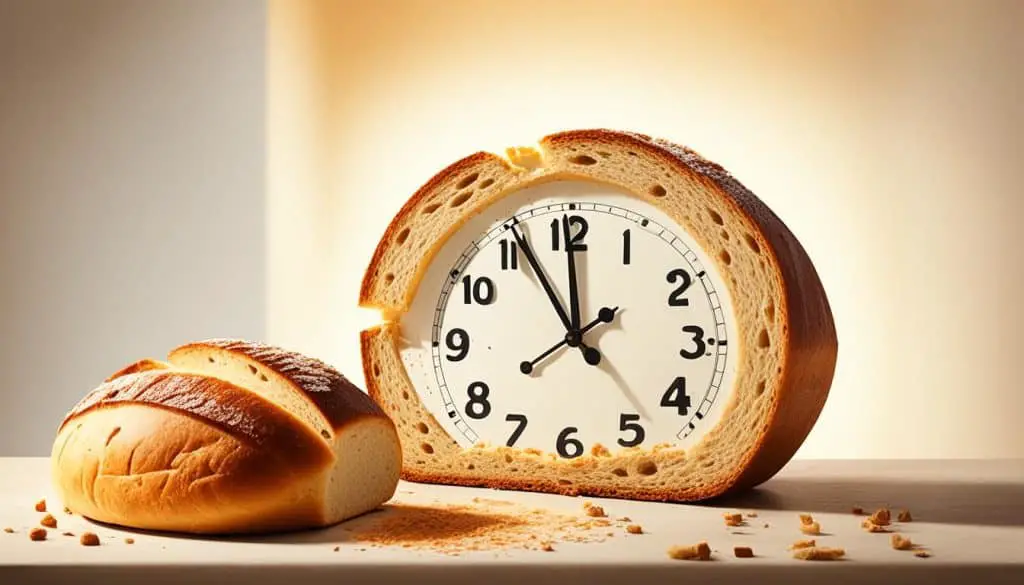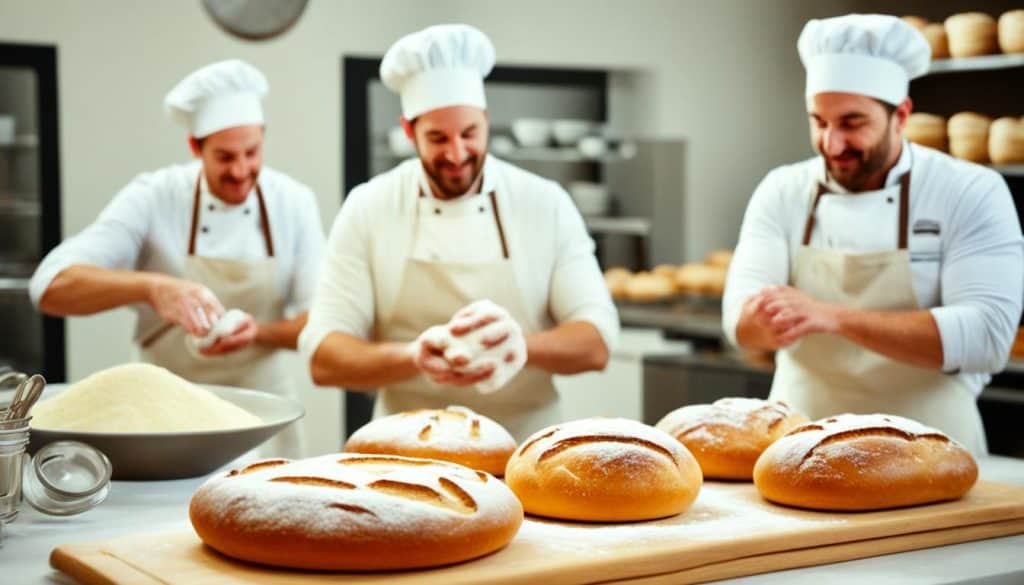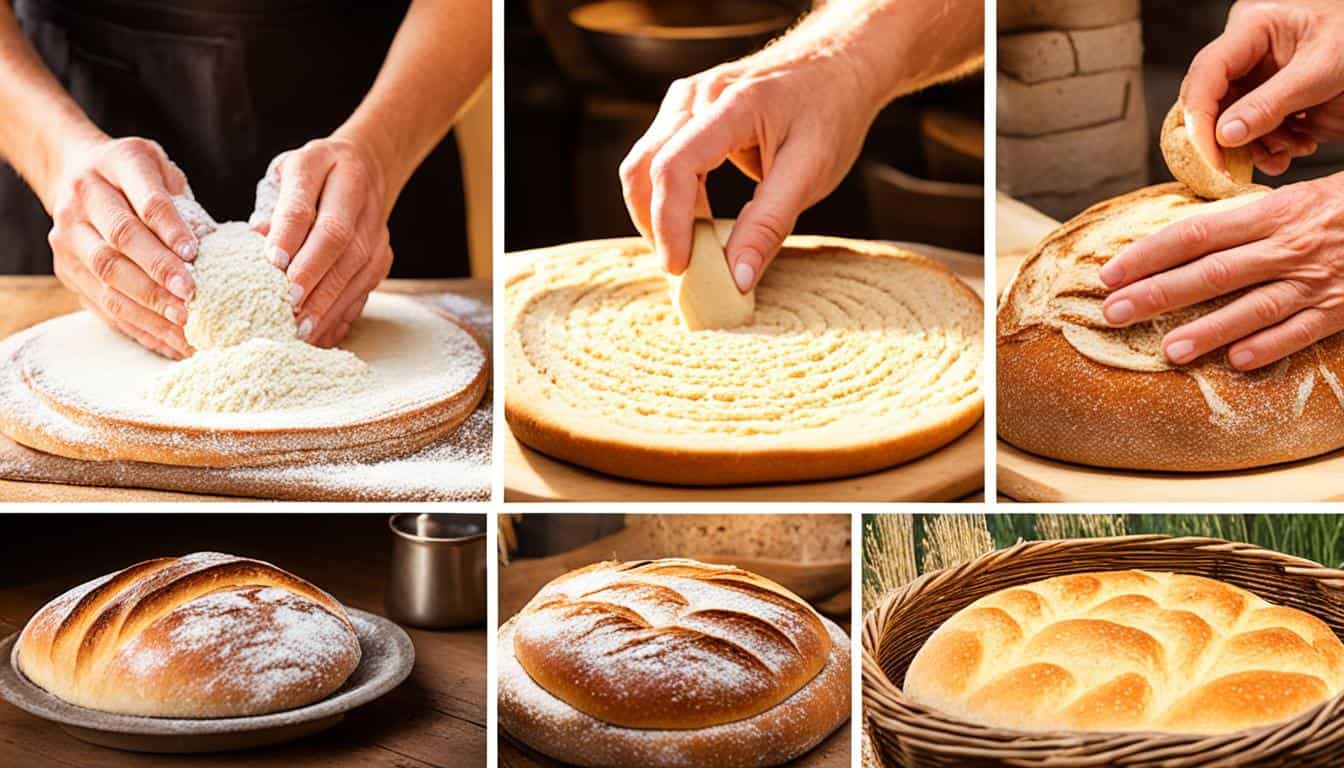Table of Contents
Have you ever asked why bread is so important in the Bible? It’s everywhere, in stories and lessons. But what does it symbolize beyond being food? Let’s explore the key biblical mentions of bread. We’ll see how important it is in both spiritual and daily aspects of life.
Imagine a journey where we talk about God’s giving, quick exits, meaningful gifts, kindness, simplicity, and crucial truths. In this journey, we’ll see bread as a link between people and God. It teaches us to trust, share, and be spiritually full.
Ready to dig into the true meaning of bread in the Bible? Let’s get started!
Daily Sustenance: God’s Provision in Exodus 16:4
In the Bible, bread often represents sustenance and provision. This is clear in Exodus 16:4. Here, the Israelites learn to depend on God for their daily food.
After leaving Egypt, the Israelites wander the desert. They face the difficulty of not having enough food. Missing the food of Egypt, they voice their concerns to Moses and Aaron.
“If only we had died by the LORD’s hand in Egypt! There we sat around pots of meat and ate all the food we wanted, but you have brought us out into this desert to starve this entire assembly to death!” (Exodus 16:3)
God shows mercy by promising to send them bread from heaven. Each day, they are to gather just what they need. This will test whether they trust God’s word.
The Israelites come to rely fully on God for their food. They learn to gather just enough bread for one day. This shows their trust in God’s provision. It keeps them going through the wilderness.
For forty years, God faithfully provides the manna. This manna is a special bread God sends to feed the Israelites daily.
This story is a lesson in trusting God for everything. It shows our need to depend on God not just for food but also for spiritual care. Like the Israelites, we should trust God for our daily needs.
In today’s world, it’s easy to focus on what we can do ourselves. The lesson of Exodus 16:4 is to remember our reliance on God. All we have, including our daily bread, comes from Him.
In a world full of uncertainty, trusting God can give us peace. By recognizing God as our main source, we find contentment. This renews our trust in His love.
| Key Takeaways |
|---|
| Exodus 16:4 shows the Israelites trusting in God’s provision for their daily food. |
| God says he will send bread from heaven. The people must only gather what they need each day. |
| This story teaches us to rely on God for both our physical and spiritual needs. |
| Knowing we depend on God brings peace and a stronger faith in His love. |
Haste Makes Waste: The Urgency in Exodus 12:34
The Israelites left Egypt quickly. They had no time to wait for their bread to rise. This symbolizes their readiness to follow God’s call and their desire to escape. They took their dough early, eager for their next step.
Their act shows how rushing can lead to some loss. Rather than patiently letting their bread rise, they chose freedom. They knew their rush was about more than losing a simple step in bread making.
Exodus 12:34 reminds us to act when the moment is right. Sometimes, we must give up comfort for a better chance. The Israelites’ story tells us that jumping into change, even fast, can lead to great things.
“For the dough shall not be leavened; for you hurriedly brought it up from Egypt, and you may not wait, nor had you prepared any provisions for yourselves.” – Exodus 12:34
Like the Israelites, we face times when quick choices are necessary. In these moments, we show our true strength. Their journey highlights the importance of being ready for sudden twists in life.
Exodus 12:34 shows the value of acting promptly when needed. The Israelites’ departure signifies a new beginning. It was full of challenges but also held a lot of promise.

| Key Points | Takeaways |
|---|---|
| The Israelites left Egypt in a hurry according to Exodus 12:34. | – Seize opportunities that need quick decisions. |
| They chose freedom over waiting for their bread to rise. | – Some sacrifices lead to bigger gains. |
| Exodus 12:34 underlines seizing chances and dealing with surprises. | – Being flexible and strong is key in life’s changes. |
Offerings Made with Care in Leviticus 2:4
Leviticus 2:4 shows us how people prepared grain offerings carefully for the Lord. They showed the importance of offering the very best to God.
“When you bring a grain offering baked in the oven as an offering, it shall be unleavened cakes of fine flour mixed with oil or unleavened wafers smeared with oil.”
Using exact amounts of ingredients, people showed their devotion. They made the offerings without yeast to keep them pure. This showed their wish to present something clean to the Lord.
Oil was added for anointing and consecration. Mixing fine flour with oil made a sweet smell. This smell pleased God, showing He was happy with their efforts.
Making these offerings was a way to honor God with great care. It’s like making something perfect for someone you deeply care about. This was a way to express their love and respect for God.
Steps for Preparing a Grain Offering:
- Measure out the fine flour, ensuring accuracy and precision.
- Mix the flour with oil, forming a smooth and cohesive dough.
- Shape the dough into unleavened cakes or wafers, maintaining their integrity.
- Bake the offering in an oven, allowing it to cook thoroughly.
These steps showed how devoted they were. They followed God’s commands closely. By giving their best to God, they proved their faith and commitment.
This table lists what you need to make an offering as in Leviticus 2:4. It helps in making the offering correctly.
Grain offerings, like the ones in Leviticus 2:4, were a way to honor God. By paying close attention to detail and choosing the best, they showed deep devotion. They wanted to please God with their actions of worship.
Hospitality in Action: Abraham and Sarah’s Encounter in Genesis 18:6
Join us in the incredible story of Abraham and Sarah meeting with angels in Genesis 18:6. It shows how making bread can be a powerful act of kindness, highlighting true hospitality at work.
In Genesis 18:6, three visitors came to see Abraham, revealed to be heavenly messengers. Abraham quickly prepared to welcome them, showing a timeless example of hospitality’s vital role.
Abraham asked Sarah to make bread for their guests. This simple yet significant offering of fresh bread showed their eagerness to share and care for their visitors.
This simple act with bread wasn’t just about food but about showing care and kindness to others. It was a clear message that through food, connections and community are built.
Such acts of kindness, like sharing a meal, are valued across the globe. They symbolize not just eating but also friendship, warmth, and being united as one.
“The act of breaking bread together goes beyond nourishing the body; it nourishes the soul. It symbolizes love, acceptance, and the willingness to provide for others.” – Author Unknown
Genesis 18:6 teaches us the incredible effect small acts of kindness can have. It calls us to use hospitality to form strong bonds, increase understanding, and bring joy to others.
Let’s think about the huge impact that hospitality, as shown by Abraham and Sarah, can have. The table below offers an overview of their story’s key points.
| Hospitality in Action | Genesis 18:6 |
|---|---|
| Act of Generosity | Bread-making |
| Symbolizes | Hospitality, care, and provision |
| Impact | Creates connections, fosters unity, and nourishes the soul |
| Essence | Small acts of kindness can make a significant difference |
Learning from Abraham and Sarah, may we also share warmth and welcome with people. Let’s spread the joy of a meal to make a real difference in others’ lives.

A Life of Frugality: Elijah’s Flight in 1 Kings 19:6
Exploring stories of key figures in the Bible, we find Elijah’s life stands out. It’s a great example of living simply and trusting in God’s care. In 1 Kings 19:6, Elijah runs from Jezebel and gets a humble meal. This shows his resilience and his trust in God’s help.
Elijah had just won a big challenge against Baal’s prophets at Mount Carmel. But he got in trouble with Jezebel, who wanted to end his life. So, Elijah ran off to the wilderness. His journey highlights a life of minimal needs and simple living.
And he looked, and, behold, there was a cake baked on the coals, and a cruse of water at his head. And he did eat and drink, and laid him down again.
Elijah’s meal was a basic cake cooked over a fire, with water. This simple food showed his complete trust in God’s care during hard times. It’s a strong example of living humbly, being happy with little, and trusting in God.
In this story, Elijah stays true to his mission of sharing God’s message. Even in hard times, Elijah showed strong faith and courage. He stayed focused on his mission, even when he had little to eat and drink.
The Lesson of Elijah’s Simple Meal
Elijah’s meal teaches us a lot about modesty and trusting in God. It contrasts with today’s focus on owning lots and constantly wanting more. This ancient story calls us to think about what truly matters in life.
The story of Elijah’s simple meal reminds us to be thankful for what we have. It points us towards finding joy in a simple life rather than constantly seeking more things. True happiness comes from recognizing God’s care for us.

Think about Elijah’s story and his trust in a simple meal. Let it guide you to live more simply and thank God for what you have. How can you follow Elijah’s example to live happily with less?
The Bread of Life: Jesus’ Proclamation in John 6:35
In the Bible, bread carries a deep meaning. John 6:35 shows Jesus calling himself the bread of life. His message is about giving our spirit food and the joy of everlasting life.
Jesus says, “I am the bread of life. Whoever comes to me will never be hungry, and whoever believes in me will never be thirsty.” These words tell us something very special. They say Jesus offers food for both our bodies and our hearts.
Just like we need food every day, Jesus says we need spiritual food. He asks us to follow him to find a life that never ends. Those who follow him won’t feel spiritually hungry or thirsty.
“I am the bread of life. Whoever comes to me will never go hungry, and whoever believes in me will never be thirsty.” – John 6:35
Jesus’ words in John 6:35 tell us to look past what we physically need. He talks about spiritual well-being. Jesus promises something more than physical bread can give – everlasting joy found through him.
This Bible verse is a reminder. It tells us that true meaning and joy come from a relationship with Jesus. He offers what our spirits yearn for, fulfilling us in ways the world can’t.
Bread feeds our bodies, but Jesus, the bread of life, feeds our spirits. Through him, we find real purpose, joy, and peace that will never end.

Bread of Life Comparison
| Physical Bread | Bread of Life (Jesus) |
|---|---|
| Meets temporary physical hunger | Satisfies eternal spiritual hunger |
| Provides sustenance for the body | Offers nourishment for the soul |
| Requires regular consumption | Provides everlasting satisfaction |
| Perishes over time | Brings eternal life |
Conclusion
In this article, we explored bread making as seen in the Bible. We looked at 6 places in the scriptures that show us how important bread is. These parts highlighted bread’s role in faith and daily living.
In Exodus 16:4, God provided manna, teaching us about daily needs. Exodus 12:34 marks when the Israelites left quickly, showing bread as a symbol of dependence. Leviticus 2:4 tells us about offering bread, showing its value as a gift to the Lord.
The story in Genesis 18:6 shows how making bread was a kind gesture. In 1 Kings 19:6, bread cooked on coals tells us about living simply. It’s a lesson in being happy with what we have.
Lastly, in John 6:35, Jesus calls himself the “bread of life.” This is about providing for our spirits and offering us a life with God forever. These stories make us see bread as more than just food. It’s about living well, being kind, and finding hope.




